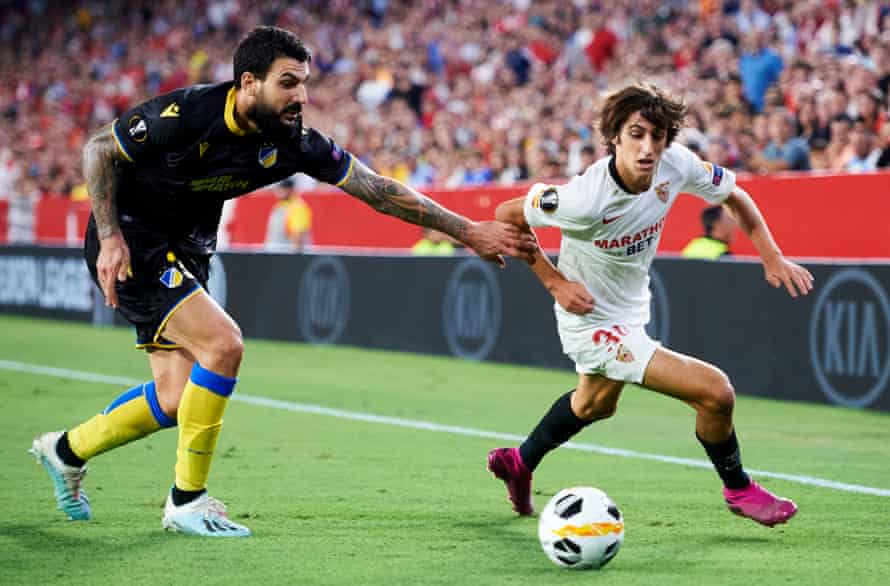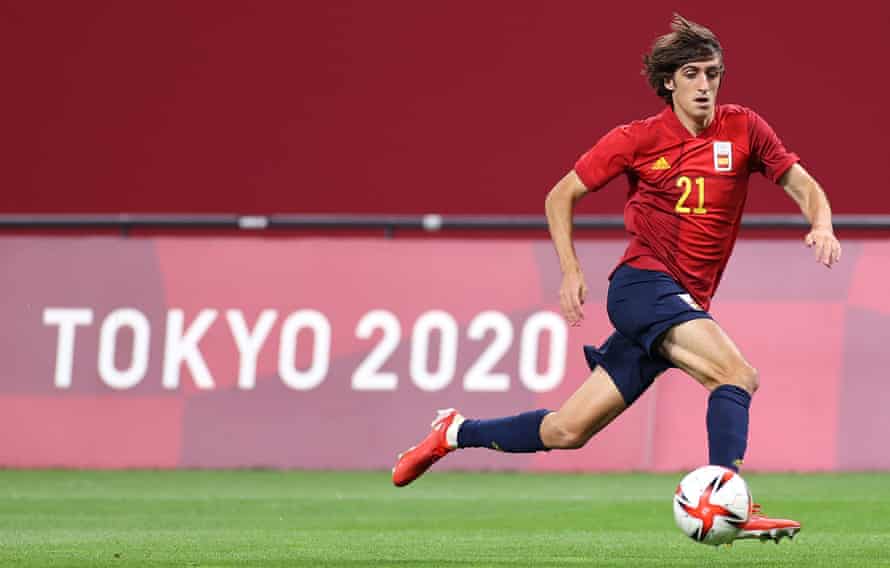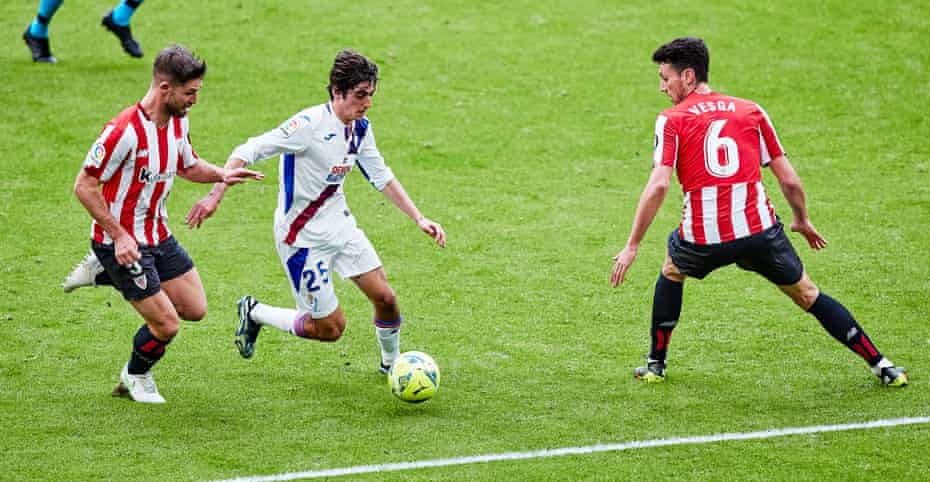‘He’s electric’: Spurs land a fearless, old-school winger in Bryan Gil
The way the story is told at Sevilla, the first time Bryan Gil turned up at the club’s training ground, one November evening when he was 11, they put him up against the biggest, strongest, hardest kid they could find. That would show how good he really was. Tall and blond, they called the kid The Russian, after Dolph Lundgren’s character in Rocky IV. His name actually was Iván too, and although he was Leiva not Drago, from Málaga rather than Siberia, he was an intimidating figure. Bryan took him apart.
Sevilla’s academy director, Pablo Blanco, recalls the story, returning later with a team picture, the two boys by then on the same side. There’s something in the legend: The Russian is twice the size of the rest. “He wasn’t the fastest or the most agile,” Blanco admits. But then Bryan, a skinny kid a year below the others did this to everyone and still does. “He came with something wild, untamed about him,” says Agustín López Páez, the youth coordinator, “and we never wanted to take that from him.”
Talking to those who have worked with Spurs’ new signing, many names emerge, comparisons that help but don’t clarify entirely. Luís Figo, Paco Gento, Rafael Gordillo. Roberto López Ufarte, Diego Capel, Nolito. Johan Cruyff too, although that’s partly about the hair. Likening him to the Beatles certainly is, but it fits the sense that he’s lifted from another time. “He’s electric, a player Spain hasn’t seen for years, since a young Joaquín or Joseba Etxeberría,” says Iñaki Bea, assistant coach at Eibar last season.
Barcelona’s scout in Andalucía saw Neymar in him, although Bryan, told that by Cadena Ser, just laughed. Instead, he mentioned Ángel Di María: “Left-footed and skinny like me.” Bea even brings up Lionel Messi: “I’m not saying he’s the same level, but there are elements. He’ll show you the ball then he’s gone. He won’t take you on for speed or strength; he’ll go around you, the ball so close that opponents give away a lot of fouls.”
Yet for all the comparisons, if there’s a word that recurs – along with desequilibrio, the ability to “unbalance” a game, to beat a man – it is different. And if there is a name that does too, especially among those at Sevilla who witnessed his first steps and accompanied his subsequent ones, it is José Antonio Reyes.
Bryan was born in February 2001 in Barbate, just along the Atlantic coast from Trafalgar and across the water from Tangier, a weather-beaten town of 22,500. Sevilla first saw him there, opponents of the local club. “He floated with the ball,” López Páez says. “He was the reincarnation of Reyes,” Blanco recalls, drawn to their shared style and path: skilful left-wingers bound for north London. Even the price was similar.

Initially Bryan travelled to training twice a week with his dad, 170km north in a car that, in the words of one coach, “wasn’t good”. The family was humble, enduring serious shortages: “Resilient, good people who never lose their smile,” López Paez says. Blanco says: “Bryan had some bollocks: brave, dedicated. I could say a thousand things about him, all good; when they’re not good they’re better.”
He soon moved into a shared room at the club’s residency in Montequinto, choosing to stay even after getting his first professional contract. There, they had put him on a diet designed to gain weight because he was so skinny and had sometimes gone without eating, but Sevilla knew he was special. Others did, too: Manchester City and Barcelona approached. “We were sure,” López Paéz says. “He loves football, loves winning. His psychomotor skills were perfect, he had stamina, he took the hits.”
Having made his first-team debut at 17 and become the first 21st-century boy to score in La Liga, loan deals followed – 12 games at Leganés, mostly off the bench; 29 at Eibar – but if everything else changed, the skinniness and style remained.

“We would joke that he should cut his hair, get a Mohican, because the look didn’t help him,” says Unai Bustinza, captain of the relegation-bound Leganés, whom Bryan joined at 18. “With his physique, age and that look, that hint of the Beatles, he was like something from a different time. In truth, the first impression was: ‘Bloody hell, how’s he going to deal with the situation we’re in?’ But in the first session, those doubts disappear. He has personality. ‘Give me the ball.’
“When things are bad, players focus on making few mistakes. A kid comes in who goes for it and that can make you nervous. Or it’s raining and you think: ‘Let’s see if he can really do it.’ But he doesn’t back down, doesn’t care about getting kicked. He’s not the kind of lad who says, ‘Don’t hurt me’ in training or avoids contact. He dares to do, always seeking one-on-ones. He was like a street player who would go and go and go. And he had stamina and athleticism too, which surprised us.”
There are parallels there to Granada’s visit to muddy, raining Eibar last season. “You think Bryan will drown in this,” said Eibar’s then manager, José Luis Mendilíbar. He scored twice.
“His main characteristic is his determination to take people on,” says Mendilíbar, an enjoyably old-school manager who played a huge part in encouraging and developing an old-school player. Bryan became Eibar’s first Spain international, recognition and pressure building. “A left-footer on the left is rare these days but he’s a pure winger: he can go outside and in but is better outside. He wants an opponent to dribble at; put the ball into space and he’ll wait to take on the defender. He beats people, gets to the line. And even if they take the ball off him, he tries again, still wants the ball.”

The word jinking could have been invented for him, only it too is from another era. A player with “cheek”, says the former Atlético striker Kiko Narváez. One whom Jorge Valdano likened to a dodgem car. Eibar’s sporting director, Fran Garagarza, sums him up: “carry, divide [opponents], finish,” a player forcing opponents on to the back foot, into their own area. López Páez compares him to the bullfighter who draws the animal close then slips away. “Art,” he calls it. Blanco refers to him as a “porculero”, which is a little rude and translates roughly as a player who just keeps on sticking it to the defender.
“He has the self-belief that David Silva had, if not the same bad milk, that touch of nastiness,” Mendilíbar says. “He has it with himself, and that’s not always good. He gets frustrated if things don’t come off, if he can’t dribble or get the ball, and he has to improve that. He has to win loose balls, anticipate. He can’t wait for it. But he never hides and won’t back down because they lay into him. Players like that are rare and I think people will like him in England.”
It may be that he starts as the man to change games from the bench, and there will be doubts of course: age, physique, language, style. Inexperience: he has played only 54 top-division games. Barbate is a long way from London, although time at Leganés and Eibar may help, despite two relegations. “That hurt him; it can be hard to deal with that,” Garagarza says. “And in England he will have to build muscle.” Bustinza says: “Relegation isn’t nice but that’s where you learn the most, unfortunately.”
Garagarza says: “He’s quiet, timid: the opposite of what he is on the pitch” – which may even help. “Bea says: “Bryan is very mature. Fame won’t have a big impact. I can’t imagine him on a yacht with four mates, chucking away €20,000. His head is right. He listens. Some think they know it all; not him. I miss players who show opponents no respect and he’s one. In the very first game, he goes past four: you think, ‘You bastard.’ He doesn’t even need space. If he can just add goals, because he has everything else. And boy, does he have personality. He’ll go for them, no doubt.”
Just ask The Russian.
Subscribe To Our Newsletter
-
How to get a free jersey
- How to get Pcs free jerseys Feedback Customer Reviews About Us Contact Us News FAQ
-
User Center
- Forget Password My Orders Tracking Order My Account Register
-
Payment & Shipping
- Customs & Taxes Locations We Ship To Shipping Methods Payment Methods
-
Company Policies
- Return Policy Privacy Policy Terms of Use Infringement Policy

